
views
Davos, Switzerland: Global business leaders warned Western governments on Wednesday that a populist crackdown on the financial industry could crimp a fragile recovery from the worst recession since the 1930s.
The worried response to US President Barack Obama's plans to tax and curb big banks, came on the opening day of the World Economic Forum, an annual gathering of some 2,500 business leaders and policymakers in the Swiss ski resort of Davos.
Surveys produced for the annual conference showed global economic confidence on the rise after deep gloom in 2009 and a cautious return to hiring, especially in emerging markets.
But the spectre of heavy-handed regulation and government intervention in the economy was the biggest cloud on many business leaders' horizon. Uncertainties over whether China will rein in its feverish pace of growth and concerns about how Greece will tackle its debt crisis also weighed.
Obama jolted markets on January 21 with proposals to force commercial banks to cut ties with hedge funds and private equity funds and stop proprietary trading, and to make the financial sector pay for a massive taxpayer bailout.
"It would be unfortunate if regulatory reforms that will be forthcoming were based on a populist message," Dennis Nally, global chairman of accountants PricewaterhouseCoopers (PwC), told Reuters.
Barclays President Bob Diamond challenged Obama's effort to limit the size of big banks and restrain risk-taking, telling the opening forum session: "I've seen no evidence that suggests that shrinking banks and making all banks smaller or more narrow is the answer."
"If you step back and say large is bad, and we move to narrow banking, the impact of that on banks and on global trade, the global economy, would be very negative."
"Without risk we do not have a banking industry ... Having banks that are well-managed and willing to take risk, and especially willing to take cross-border risk, is essential if we want to have jobs and economic growth," Diamond added.
CONFIDENCE REBOUNDS
A PwC study showed business confidence bouncing back after the sharpest drop in economic activity since World War Two, prompting more industry leaders to start hiring again.
The survey of 1,200 chief executives in 52 countries found 39 per cent of industry bosses aimed to hire extra staff in 2010, while 25 per cent planned more job cuts, down from nearly half who slashed jobs last year.
But recruitment will be on a modest scale and mostly in booming emerging economies such as China and India, rather than in the developed world, the report showed.
Obama's proposed curbs on Wall Street drew guarded support from European governments but could complicate efforts to build a global consensus on financial regulation in the G20 grouping of major economies.
European Central Bank President Jean-Claude Trichet played down transatlantic differences, telling the Wall Street Journal the proposed US reforms were "relevant and interesting" and shared the same aims as European measures.
"They go in the same direction of our own position, namely ensuring that the banking sector focuses on financing the real economy, which is its key role," he said. But he called for coordination to avoid creating loopholes in the integrated international financial system.
French President Nicolas Sarkozy, a champion of regulation and state industrial policy who has demanded a "moralisation of capitalism", was to give the keynote address later on Wednesday.
Against a backdrop of public outrage over bumper bonuses for bankers whose institutions were saved by taxpayer intervention, aides said Sarkozy would insist there must be no return to the excesses of financial speculation and deregulation.
US economist Nouriel Roubini, who warned that the 2008 financial crisis was coming, said loose US monetary policy was now fuelling asset price bubbles that would cause the next bust.
"It's become too much, too fast, too soon and U.S. monetary policy is being exported to the rest of the world," Roubini told a forum session.
In contrast to many business speakers, he said he was not concerned about over-regulation but about a return to business as usual.
Jonathan Nelson, CEO of US private equity firm Providence Equity Partners, urged governments and the financial sector to stop finger-pointing and focus on improving management.
"We need to get away from the blame game. We all share responsibility for what happened here... There was reckless lending, there was reckless borrowing too, all against a background of public policy that (made it) desirable," he said.
Some of the most high-profile bankers, including Goldman Sachs CEO Lloyd Blankfein and JPMorgan Chase's Jamie Dimon, pulled out of this year's Davos meeting.
But the CEO's of two major bailed-out U.S. banks -- Citigroup's Vikram Pandit and Bank of America's Brian Moynihan -- were due to attend.
They may be in for a rough ride not only from politicians but also from some fellow business leaders.
Joergen Ole Haslestad, CEO of Norway's Yara International ASA, one of the world's biggest fertiliser producers, told Reuters: "I think greed took over in the last few years. At some of the financial institutions there was too much money flowing to too many young people doing to little value-added."




















Comments
0 comment